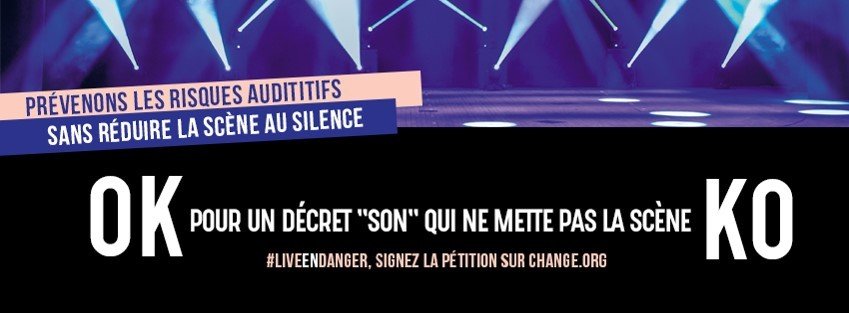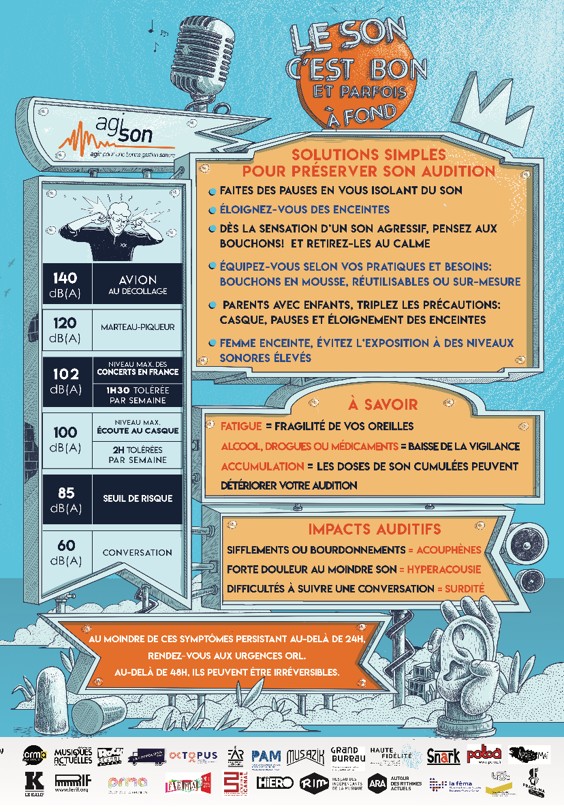Music is not noise!
An introduction to sound regulations in Europe
Sound levels inside a venue
The regulation of the sound levels inside a venue is meant to protect the hearing of the audience as well as the one of people working in the venue.
In Europe, the sound levels authorized vary from:
90 db(A) to 114 db(A)
with momentary peaks up to 140 db(C).
Sound is regulated in a strict manner in some countries and only through recommandations in other countries.
The duration of the sound exposure is also a criteria taken into account when regulating sound levels.
Some countries have to set up periods or places of less than 80 db(A) for the audience and workers to rest their ears.
Sound emissions (outside a venue)
The sound emissions of a venue, that is the sound perceived from outside the venue, are regulated differently depending on what hour of the day or night it is.
At night, venues must respect stricter sound regulations than in the day.
Some venues even have a curfew after which they cannot emit any music!
Prevention
Preserving the hearing health of the audience and the workers inside a venue is crucial.
Many venues have set (by law or by themselves) some prevention tools, such as:
- Free earplugs available for the audience
- Visual indicators of the sound level (show sound levels in real time or posters informing the public of the hearing risks )
Specific attention is given to children's sound exposure. Sometimes children under 13 are unfortunately not allowed inside a venue.
Examples of prevention campaigns
The association has launched a petition for a revision of the sound decree in France (click on the image above to access the petition).
In the Netherlands, VNPF took part in a 4 years agreement with the authorities in order to have sound regulations that everybody agrees on.
They also developed the prevention campaign "I love my ears"
Most of the time, live music professionals are not part of the policy making that rules their sector, work and everyday life
Who controls this?
Sound regulations come from different levels:
European, national, regional or local.
They can be in the form of laws, decrees, edicts or recommendations.
What the live music sector is concerned about
All the live music professionals representatives present at the Working Group on sound regulations agree that sound levels need attention.
The following opinions came out from the Live DMA Working Group:
Artistic Impact
"Local rules create inequalities among a same country and complexifies touring bands as they need to comply to different reglementations for each different gig"
"The sound reglementations endanger artistic diversity as music genres with heavy bass frequencies are disadvantaged and risk to be less programmed in venues because organizing such concerts is more difficult."
"Sound regulations that are too strict might alter the experience of live music and make it nonsensical."
"It is very expensive and difficult to implement the reglementation."
"The chain of responsability is unclear. Are music venues the sole responsible for managing sound emissions?"
"The entities controlling the sound levels are not music professionals and are not competent enough to regulate such issues."
Political Framework
"The densification of population and buildings in European cities is not adapted to the sound regulations"
Urban Development
"One individual complaint from a neighbour can close down a venue. It seems unbalanced compared to the many individuals who profit from the benefits of attending a live music show!"
Legal voids in the reglementations
The various laws and recommendations can be interpreted in different ways.
What is considered as noise and a nuisance is very subjective.
Challenges the live music sector faces
Financial challenges: it is very expensive to conform to the law and make a venue 100% soundproof.
Technical challenges: the solutions proposed by the authorities are often expensive and unadapted.
No solution has been proposed to manage the people once they are outside the venue.
What do the venues risk if they do not comply to the regulations ?
The venues risk:
- penalties and fines
- restrictions such as the prohibition of organizing shows for a certain period of time
- administrative closure


